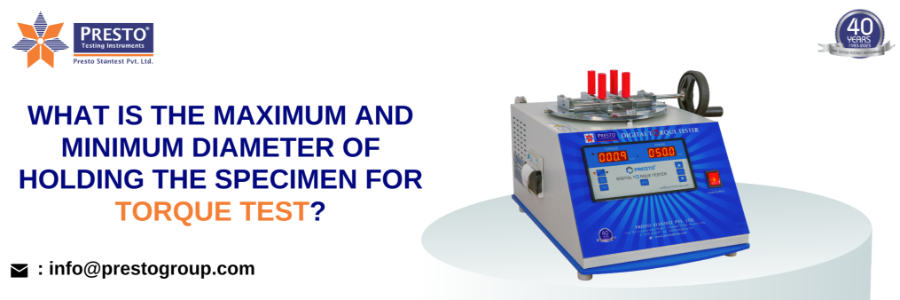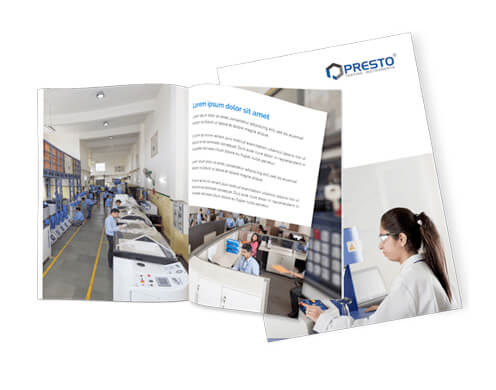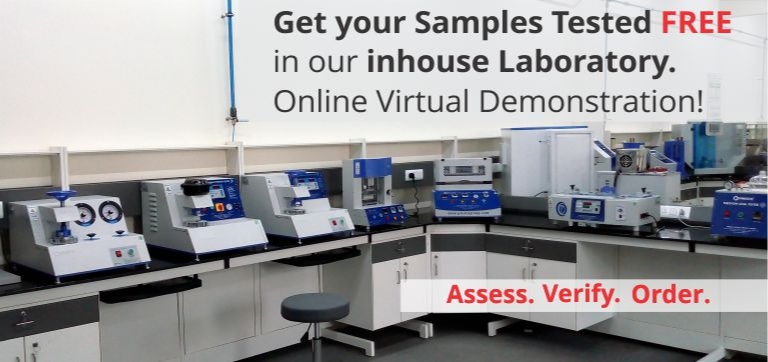What is the Maximum and Minimum Diameter of Holding the Specimen for Torque Test?

The maximum and minimum diameter for holding a specimen during a torque test depends on the design and specifications of the torque testing equipment being used. In torque testing, the specimen is subjected to rotational force to assess its resistance to twisting or turning. The fixture or grip that holds the specimen plays a crucial role in ensuring accurate and reliable torque measurements.
With Presto digital torque testing equipment with printer, manufacturers of the bottle industry can easily conduct torque tests on the materials and ensure that accurate products will be delivered to the customers. In this Blog, we will discuss the maximum and minimum diameter that will be required for holding the specimen accurately for the torque test.
Understanding the Concept of Maximum and Minimum Diameter for Holding Specimens in Torque Testing
We all know that bottle cap torque testing is an important aspect of quality assurance for the bottle testing industry. With the Presto torque machine for bottle caps testing, manufacturers can easily measure the rotational force that will be required to twist and turn a specimen until it breaks. This will help the manufacturers in determining the strength and durability of materials.
One essential factor that will help the users in influencing the reliability and accuracy of torque testing is the maximum and minimum diameter, for holding the testing specimen. The diameter of torque refers to the size and thickness of the specimen being used and tested.
Various torque testers have different diameters for holding and placing the specimen. Whenever the user conducts the test it is important for the manufacturers to hold the testing specimen tightly so that the specimen will be held at their place without any slippage.
For the Presto torque tester for bottle caps and jars, manufacturers will get the minimum diameter for specimen holding i.e. 30 mm and the maximum diameter for specimen holding i.e. 110 mm.
This torque tester for bottle caps and jars will help the manufacturers ensure the accuracy and reliability of lab testing results.
Impact of Incorrect Diameter on Torque Test Results
The Presto digital torque tester is one of the widely used laboratory testing equipment that will help the manufacturers conduct torque tests on the bottles.
The maximum and minimum diameter of a specimen is a crucial factor in torque testing measurement, as it directly affects the accuracy and reliability of the lab test results. The incorrect determination of these diameters can have significant impacts on the performance evaluation and quality control processes for various products.
One of the major influences that incorrect maximum and minimum diameters can have on torque test results is an inaccurate measurement. If the maximum and minimum diameters are not accurately determined, it can lead to errors in measuring the applied torque force. This can result in misleading data, causing potential issues with product design, functionality, and safety.
With digital torque machines for bottle caps, manufacturers can easily and accurately determine the torque capacity of the machine and ensure that the right torque value of the specimen will be determined.
This high-quality bottle testing instrument can save 9 sample readings with digital readout and help users monitor the peak load facility of the specimen and get highly accurate lab testing results.
If you want to know about torque tester prices, then you can easily get in contact with our technical team of experts.
Case Study Depicting How Presto Torque Tester Has Helped Global Brand
Introduction
In the ever-evolving landscape of beverage manufacturing, ensuring product quality is paramount. For industry leaders like Coca-Cola, maintaining the integrity of packaging is crucial to preserving the freshness and safety of their iconic products. One key aspect of this quality control process is the precise measurement of torque values on bottle closures. This case study explores how Coca-Cola leveraged the Presto Torque Tester to streamline and enhance its torque testing procedures.
Background
Coca-Cola, is considered to be one of the famous brand to provide beverages to their customers. Bottle closures play a pivotal role in preserving the carbonation and freshness of Coca-Cola beverages. To ensure the optimal performance of these closures, Coca-Cola sought to upgrade their torque testing methods.
Challenges
Before integrating Presto Torque Testers into their quality assurance process, they faced several challenges related to torque testing:
Inconsistent Torque Values: The existing torque testing methods were prone to variations, leading to inconsistent torque values across different production batches.
Manual Testing Limitations: The reliance on manual torque testing introduced the possibility of human error, affecting the accuracy of measurements.
Time-Consuming Processes: Traditional torque testing methods were time-consuming, causing delays in the production line and reducing overall efficiency.
Solution
To address these challenges, Coca-Cola opted to implement Presto Torque Testers, renowned for their precision, automation capabilities, and user-friendly interfaces.
Implementation
Coca-Cola integrated the Presto Torque Tester seamlessly into their production line. The testers were strategically placed at key points in the manufacturing process, allowing for real-time torque testing without disrupting the production flow.
Benefits Realized
Enhanced Accuracy: The Presto Torque Testers provided Coca-Cola with highly accurate torque measurements, eliminating the inconsistencies that were previously encountered.
Automation for Efficiency: The automated nature of the torque testers significantly reduced the reliance on manual labour, improving efficiency and minimizing the risk of human error.
Streamlined Production: With real-time torque testing, Coca-Cola experienced a streamlined production process. The testers operated seamlessly within the production line, ensuring that torque values were consistently met without causing delays.
Data Logging and Analysis: Presto Torque Testers came equipped with advanced data logging features. Coca-Cola could now record and analyze torque values over time, facilitating proactive maintenance and quality trend analysis.
Adaptability to Various Bottle Sizes: The flexibility of Presto Torque Testers allowed Coca-Cola to test torque values across a range of bottle sizes. The adjustable grips ensured that the testers could accommodate different closure dimensions, providing a versatile solution for their diverse product line.
ROI and Long-Term Impact
The adoption of Presto Torque Testers resulted in a notable return on investment for Coca-Cola. The improved accuracy and efficiency of torque testing translated into cost savings, reduced product recalls, and enhanced brand reputation. Over time, the long-term impact of integrating these testers has been evident in the consistently high quality of Coca-Cola's bottled products.
Conclusion
In conclusion, the implementation of Presto Stantest Pvt Ltd Torque Testers has proven to be a game-changer for Coca-Cola's quality assurance processes. By addressing the challenges of inconsistent torque values, manual testing limitations, and time-consuming procedures, Coca-Cola has not only enhanced the reliability of their product but also optimized its production efficiency. This case study underscores the significance of adopting cutting-edge technology in quality control and how it can positively impact renowned brands in the beverage industry.
If you also want to test to visit your testing lab for your testing needs, then you can give us a call at +919210903903 or email us at info@prestogroup.com.
Author : -Gaurav Malhotra
you may also like
- Avoiding Road Transit Hassles with the Vibration Table
- Attain Firm & Integrated Bottle Closures with the Digital Torque Tester
- Avoid Product Damage due to Slippage with the Coefficient Of Friction Tester
- Guarantee Robust Corrugated Sheets with the Edge Crush Tester
- How to Make Deformation Resistant Cartons with the Box Compression Tester?
Recent News
- Paper & Packaging Testing Instruments
- Paint, Plating & Coating Testing Instruments
- Plastic & Polymer Testing Instruments
- Environmental Testing Chambers
- PET & Preform Testing Instruments
- Color Measuring Testing Instruments
- View Entire Range Instruments

Catalogue 2023
Get information about new product launches, research, innovation and endeavors at Presto.
download Free Copy
Quick quote

